2016-2017学年 译林版 选修6 Unit4 Helping people around the world Task 课件 (119张)
文档属性
| 名称 | 2016-2017学年 译林版 选修6 Unit4 Helping people around the world Task 课件 (119张) |  | |
| 格式 | zip | ||
| 文件大小 | 1.0MB | ||
| 资源类型 | 教案 | ||
| 版本资源 | 牛津译林版 | ||
| 科目 | 英语 | ||
| 更新时间 | 2017-10-21 19:06:05 | ||
图片预览


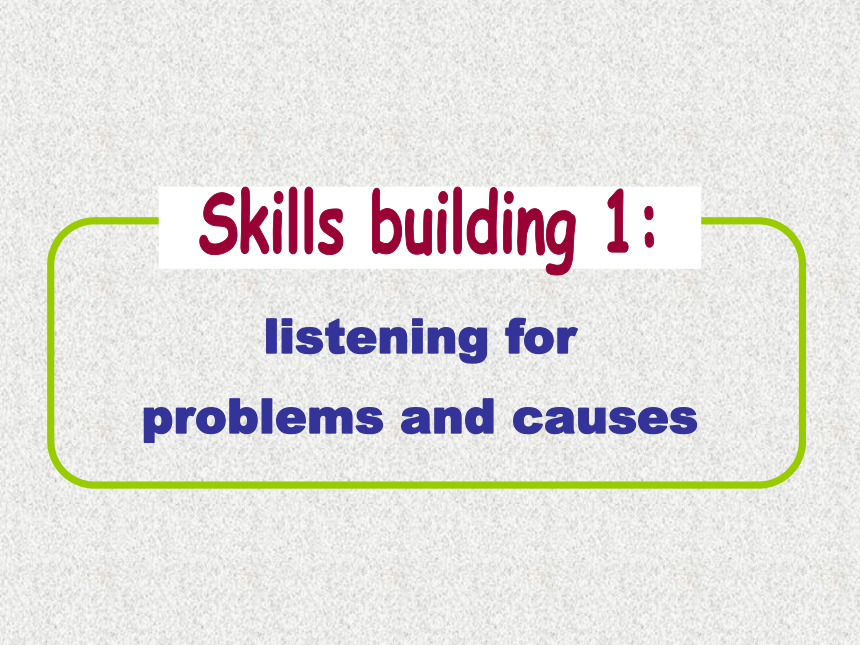
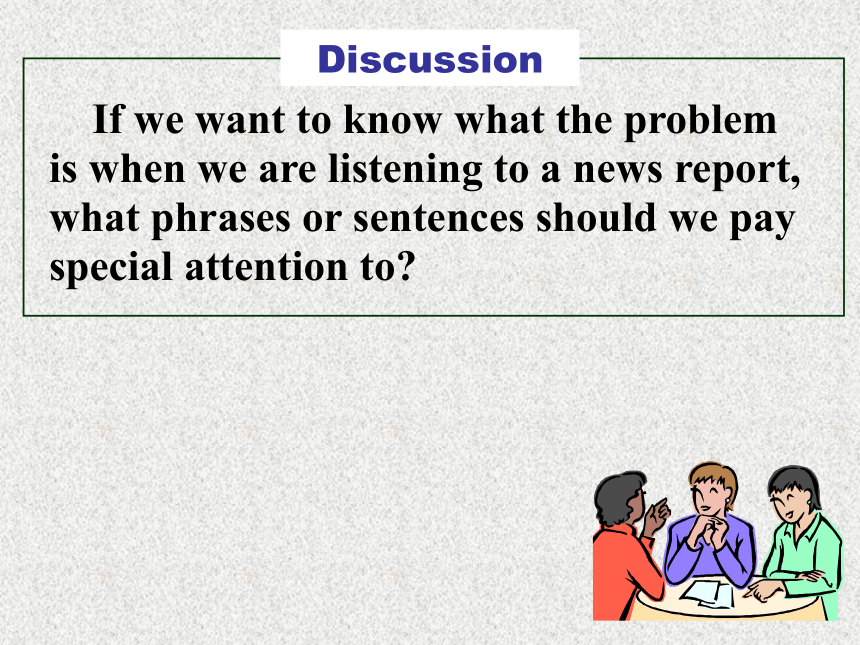

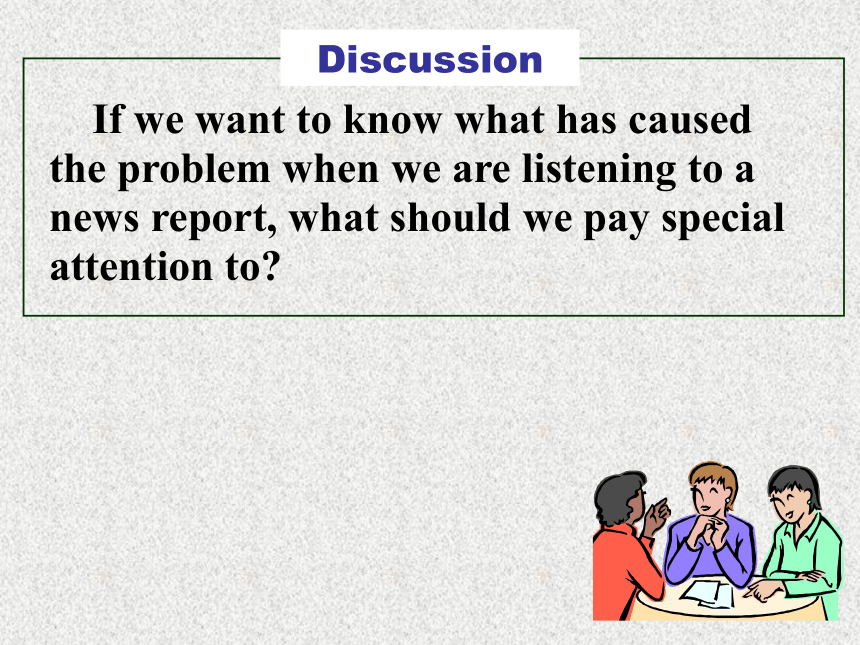
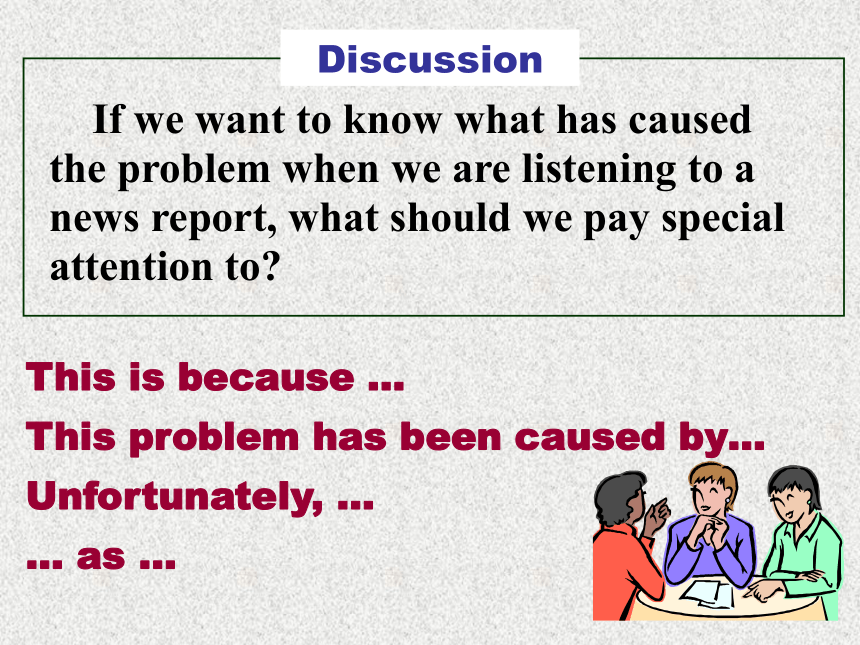
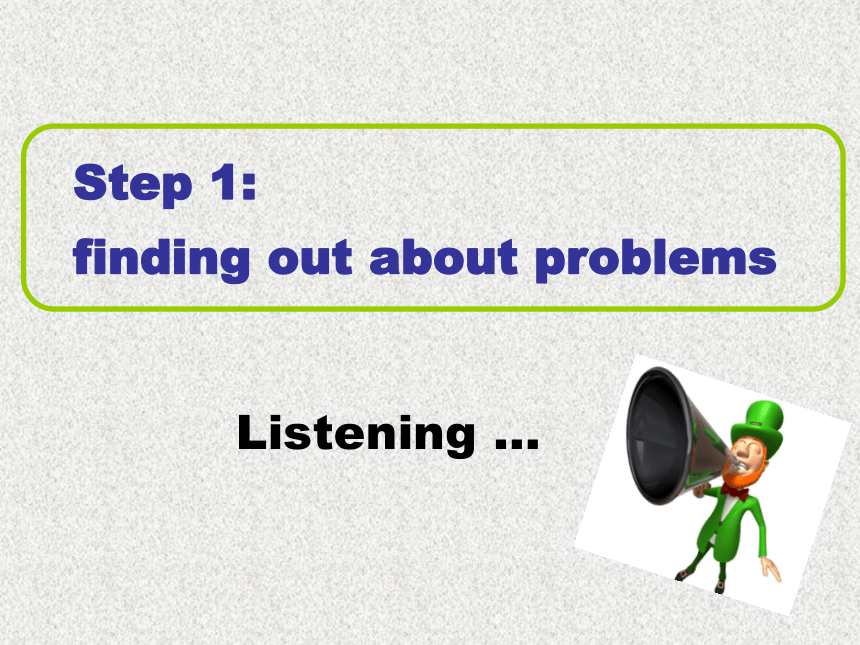
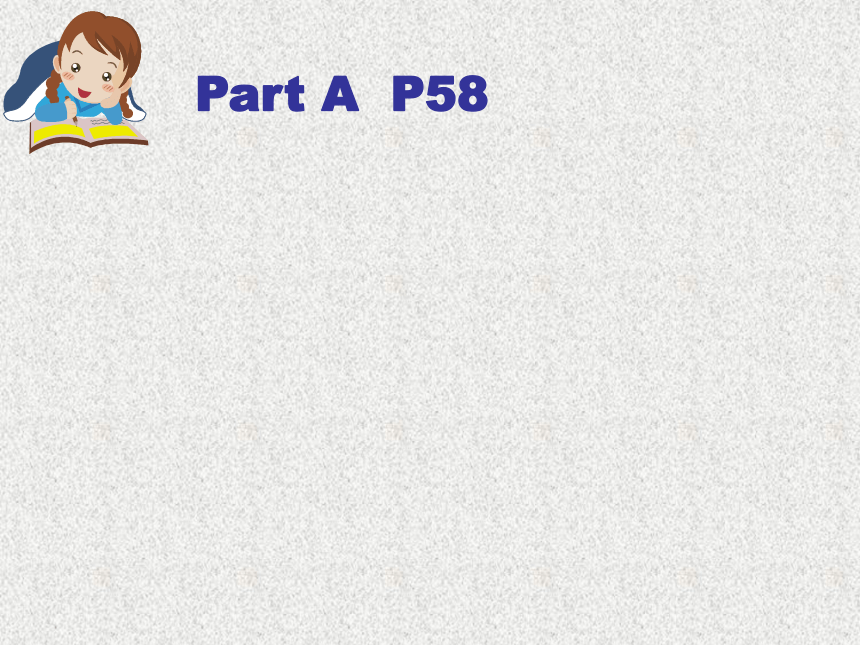
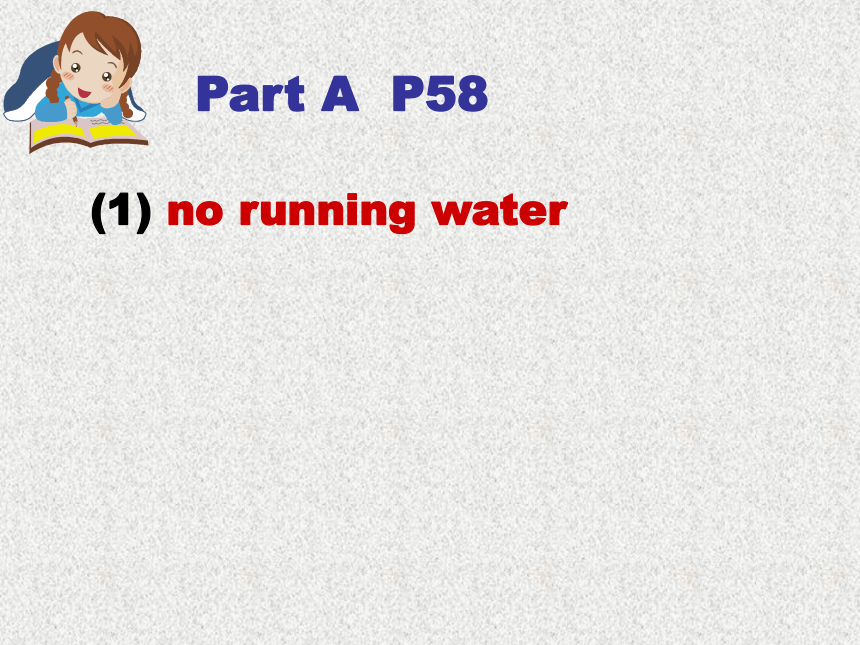
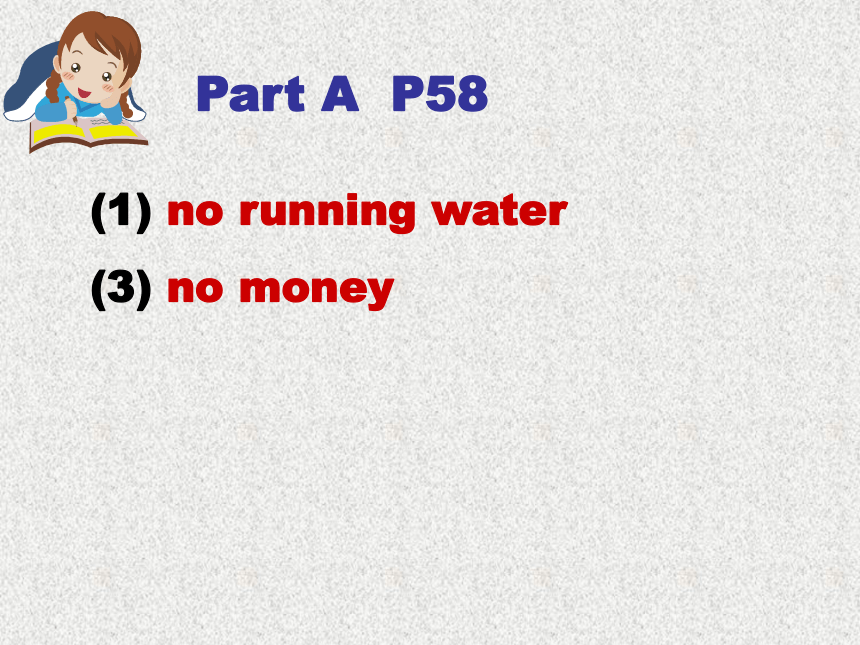
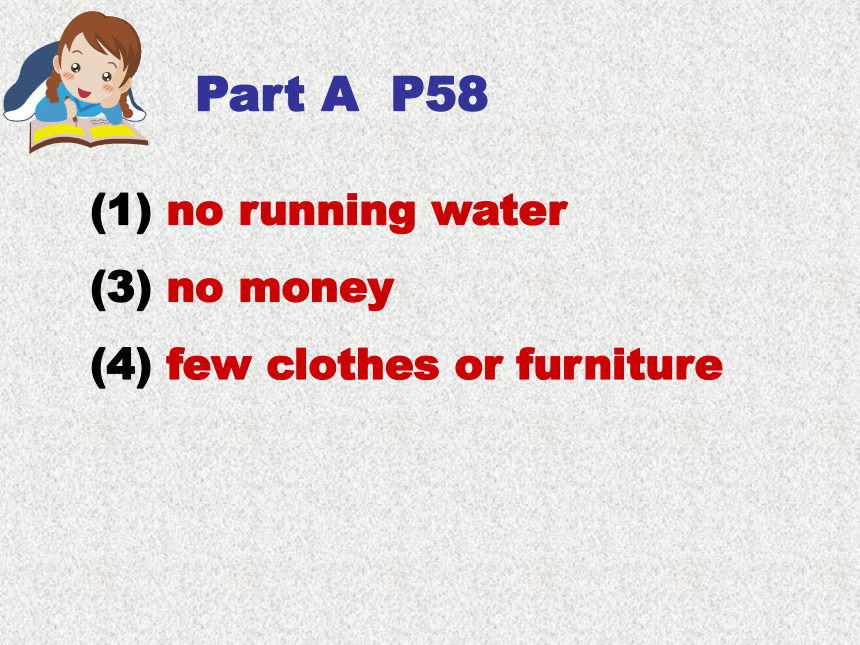
文档简介
课件119张PPT。Unit 4 Helping people around the world主讲:黄曼琳listening for
problems and causes Skills building 1: If we want to know what the problem
is when we are listening to a news report,
what phrases or sentences should we pay
special attention to?Discussion If we want to know what the problem
is when we are listening to a news report,
what phrases or sentences should we pay
special attention to?The problem is that…
As you can see…
The result is …
This means …Discussion If we want to know what has caused
the problem when we are listening to a
news report, what should we pay special
attention to? Discussion If we want to know what has caused
the problem when we are listening to a
news report, what should we pay special
attention to? This is because …
This problem has been caused by…
Unfortunately, …
… as … DiscussionStep 1:
finding out about problemsListening …Part A P58(1) no running waterPart A P58(1) no running water
(3) no moneyPart A P58(1) no running water
(3) no money
(4) few clothes or furniturePart A P58(1) no running water
(3) no money
(4) few clothes or furniture
(5) no electricityPart A P58(1) no running water
(3) no money
(4) few clothes or furniture
(5) no electricity
(6) forest has been cut down Part A P58Part B P59(1) povertyPart B P59(1) poverty
(2) many children, especially
girls, do not go to schoolPart B P59(1) poverty
(2) many children, especially
girls, do not go to school
(4) all farming is done by handPart B P59(1) poverty
(2) many children, especially
girls, do not go to school
(4) all farming is done by hand
(5) small amount of land and
water available Part B P59(6) children have poor diets(6) children have poor diets
(7) children do not grow properly(6) children have poor diets
(7) children do not grow properly
(8) many of the children’s
parents have died of AID(6) children have poor diets
(7) children do not grow properly
(8) many of the children’s
parents have died of AID
(9) grandparents have to bring
up children(6) children have poor diets
(7) children do not grow properly
(8) many of the children’s
parents have died of AID
(9) grandparents have to bring
up children
(10) grandparents are old and
poor Complete the table in Parts A and B.Part A
(2) repairing of pumps takes
several days
Complete the table in Parts A and B.Part A
(2) repairing of pumps takes
several days
Part B
(3) not enough money Complete the table in Parts A and B.discussing in groupsSkills building 2: expressing
agreement / disagreement making suggestions asking for opinions making conclusionStep 2:
making suggestions What can we do to help the
poor children in northern
Thailand? raise some money for them raise some money for them
donate pocket money raise some money for them
donate pocket money
give away some books raise some money for them
donate pocket money
give away some books
give them some clothes writing a proposalSkills building 3:Step 3: composing a proposalTitle:Group members:Helping the hill tribe children in
northern Thailand(Students’ owe names)a proposal to UNICEFIntroduction:We have been researching the problems
faced by the children in northern
Thailand. There are many villages in
northern Thailand where children do not
have books. Their classrooms have no
roofs. Many girls cannot go to school.
Our group would like to help them.Proposal:We would like to help the children by:
1. donating the money collected from the
students and teachers in our school
2. donating English books collected from the
students in our school
3. donating clothes collected from the students
in our school writing a letter to them to tell
them that we want to do what we can to
help themBenefits: Helping the hill tribe children in northern
Thailand to go to school and live a better life
Helping us recognize that there are many
people in the world that need help
We would be pleased if you would approve
our proposal. If you require any further
information, please contact us.
Our contact details are:
(Students’ school address) Language pointsfacebreak down means face1) v.
[I usually + adverb or preposition; T]
to turn or be turned towards something
physically; to be opposite: 面对,面向face The terrace faces towards the sea / faces
south. 1) v.
[I usually + adverb or preposition; T]
to turn or be turned towards something
physically; to be opposite: 面对,面向face The terrace faces towards the sea / faces
south.
Their houses face each other across the
street.1) v.
[I usually + adverb or preposition; T]
to turn or be turned towards something
physically; to be opposite: 面对,面向face2) [T]
If you face a problem, or a problem
faces you, you have to deal with it:
面临问题,(问题等) 逼近face This is one of the many problems faced
by working mothers.2) [T]
If you face a problem, or a problem
faces you, you have to deal with it:
面临问题,(问题等) 逼近face This is one of the many problems faced
by working mothers.
Passengers could face long delays.2) [T]
If you face a problem, or a problem
faces you, you have to deal with it:
面临问题,(问题等) 逼近face This is one of the many problems faced
by working mothers.
Passengers could face long delays.
You're faced with a very difficult choice
there.2) [T]
If you face a problem, or a problem
faces you, you have to deal with it:
面临问题,(问题等) 逼近face3) [T]
to accept that something unpleasant is
true and start to deal with the situation:
正视(问题)face I think Phil has to face the fact that she no
longer loves him.
3) [T]
to accept that something unpleasant is
true and start to deal with the situation:
正视(问题)face I think Phil has to face the fact that she no
longer loves him.
We have to face facts here — we simply
don't have enough money.3) [T]
to accept that something unpleasant is
true and start to deal with the situation:
正视(问题)face I think Phil has to face the fact that she no
longer loves him.
We have to face facts here — we simply
don't have enough money.
He's dying but he refuses to face the truth.3) [T]
to accept that something unpleasant is
true and start to deal with the situation:
正视(问题)faceface up to sth.phrasal verbface up to sth.to accept that a difficult situation exists:phrasal verbface up to sth.to accept that a difficult situation exists:phrasal verb She's going to have to face up to the fact
that he's not going to marry her.face up to sth.to accept that a difficult situation exists:phrasal verb She's going to have to face up to the fact
that he's not going to marry her.face-to-faceadv. , adj. [before noun]face up to sth.to accept that a difficult situation exists:phrasal verb She's going to have to face up to the fact
that he's not going to marry her.face-to-facedirectly, meeting someone in the same place:adv. , adj. [before noun]face up to sth.to accept that a difficult situation exists:phrasal verb She's going to have to face up to the fact
that he's not going to marry her.face-to-facedirectly, meeting someone in the same place: We've spoken on the phone but never
face-to-face.
adv. , adj. [before noun]face up to sth.to accept that a difficult situation exists:phrasal verb She's going to have to face up to the fact
that he's not going to marry her.face-to-facedirectly, meeting someone in the same place: We've spoken on the phone but never
face-to-face.
She came face-to-face with the gunman
as he strode into the playground.adv. , adj. [before noun]to sb.'s faceto sb.'s faceIf you say something unpleasant to
someone's face, you say it to them directly,
when you are with them:to sb.'s faceIf you say something unpleasant to
someone's face, you say it to them directly,
when you are with them: If you've got something to say, say it to
my face.to sb.'s faceIf you say something unpleasant to
someone's face, you say it to them directly,
when you are with them: If you've got something to say, say it to
my face.in the face of sth.to sb.'s faceIf you say something unpleasant to
someone's face, you say it to them directly,
when you are with them: If you've got something to say, say it to
my face.in the face of sth.despite having to deal with a difficult
situation or problem:to sb.'s faceIf you say something unpleasant to
someone's face, you say it to them directly,
when you are with them: If you've got something to say, say it to
my face.in the face of sth.despite having to deal with a difficult
situation or problem: She left home in the face of strong
opposition from her parents. ____ with so much trouble, we failed to
complete the task on time.
A. Faced B. Face
C. Facing D. To face
_____ with a difficult situation, Arnold
decided to ask his boss for advice.
A. To face B. Having faced
C. Faced D. Facing高 考 链 接 ____ with so much trouble, we failed to
complete the task on time.
A. Faced B. Face
C. Facing D. To face
_____ with a difficult situation, Arnold
decided to ask his boss for advice.
A. To face B. Having faced
C. Faced D. Facing高 考 链 接 ____ with so much trouble, we failed to
complete the task on time.
A. Faced B. Face
C. Facing D. To face
_____ with a difficult situation, Arnold
decided to ask his boss for advice.
A. To face B. Having faced
C. Faced D. Facing高 考 链 接break downbreak down1) If a machine or vehicle breaks down, it
stops working: 机器出故障,汽车抛锚
break down1) If a machine or vehicle breaks down, it
stops working: 机器出故障,汽车抛锚
Our car broke down and we had to
push it off the road.break down1) If a machine or vehicle breaks down, it
stops working: 机器出故障,汽车抛锚
2) If a system, relationship or discussion
breaks down, it fails because there is a
problem or disagreement. 计划等失败Our car broke down and we had to
push it off the road.3) to be unable to control your feelings
and to start to cry: 精神崩溃3) to be unable to control your feelings
and to start to cry: 精神崩溃When we gave her the bad news,
she broke down and cried.break 常用短语:break 常用短语:break awayvt. / vi.
断掉;拆除;剪掉;
与…断绝关系 (from)break 常用短语:break in vi. 强行闯入;打岔break awayvt. / vi.
断掉;拆除;剪掉;
与…断绝关系 (from)break 常用短语:break in vi. 强行闯入;打岔
break into vt. 闯入,进入break awayvt. / vi.
断掉;拆除;剪掉;
与…断绝关系 (from)break 常用短语:break in vi. 强行闯入;打岔
break into vt. 闯入,进入
break off vt. 折断,拆掉
vi. 停止说话,稍事休息break awayvt. / vi.
断掉;拆除;剪掉;
与…断绝关系 (from)break out vi.
突然发生,爆发break out vi.
突然发生,爆发
break through vt. / vi.
突破 (障碍)break out vi.
突然发生,爆发
break through vt. / vi.
突破 (障碍)
break up vt. / vi.
击碎,拆散;结束;终止; (与)人分 He grabbed her, but she managed to
break away.
He grabbed her, but she managed to
break away.
The burglars broke in through the
kitchen window. He grabbed her, but she managed to
break away.
The burglars broke in through the
kitchen window.
My car's been broken into twice this
month. He grabbed her, but she managed to
break away.
The burglars broke in through the
kitchen window.
My car's been broken into twice this
month.
As she was talking, he suddenly broke
in, saying, "That's a lie". He grabbed her, but she managed to
break away.
The burglars broke in through the
kitchen window.
My car's been broken into twice this
month.
As she was talking, he suddenly broke
in, saying, "That's a lie".
War broke out in 1914. Fighting has broken out all over the city. Fighting has broken out all over the city.
He broke off a piece of chocolate. Fighting has broken out all over the city.
He broke off a piece of chocolate.
She broke off in the middle of a sentence. Fighting has broken out all over the city.
He broke off a piece of chocolate.
She broke off in the middle of a sentence.
Protesters broke through the barriers. Fighting has broken out all over the city.
He broke off a piece of chocolate.
She broke off in the middle of a sentence.
Protesters broke through the barriers.
She's just broken up with her boyfriend. Fighting has broken out all over the city.
He broke off a piece of chocolate.
She broke off in the middle of a sentence.
Protesters broke through the barriers.
She's just broken up with her boyfriend.
We broke up for the holidays in June.1. News reports say peace talks between
the two countries _________ with no
agreement reached.
A. have broken down
B. have broken out
C. have broken in
D. have broken up高 考 链 接1. News reports say peace talks between
the two countries _________ with no
agreement reached.
A. have broken down
B. have broken out
C. have broken in
D. have broken up高 考 链 接2. The computer system suddenly_______
while he was searching for information
on the Internet.
A. broke down
B. broke out
C. broke up
D. broke in高 考 链 接2. The computer system suddenly_______
while he was searching for information
on the Internet.
A. broke down
B. broke out
C. broke up
D. broke in高 考 链 接3. I was still sleeping when the fire ____ ,
and then it spread quickly.
A. broke out B. put out
C. came out D. got out
4. We’re trying to ring you back, Bryan,
but we think we ______ your number
incorrectly.
A. looked up B. took down
C. worked out D. brought about 高 考 链 接3. I was still sleeping when the fire ____ ,
and then it spread quickly.
A. broke out B. put out
C. came out D. got out
4. We’re trying to ring you back, Bryan,
but we think we ______ your number
incorrectly.
A. looked up B. took down
C. worked out D. brought about 高 考 链 接3. I was still sleeping when the fire ____ ,
and then it spread quickly.
A. broke out B. put out
C. came out D. got out
4. We’re trying to ring you back, Bryan,
but we think we ______ your number
incorrectly.
A. looked up B. took down
C. worked out D. brought about 高 考 链 接means: [c]
a method or way of doing something: 方法 They had no means of communication.means: [c]
a method or way of doing something: 方法 They had no means of communication.
We need to find some other means of
transportation.means: [c]
a method or way of doing something: 方法 They had no means of communication.
We need to find some other means of
transportation.
We must use every means at our disposal.means: [c]
a method or way of doing something: 方法 They had no means of communication.
We need to find some other means of
transportation.
We must use every means at our disposal.
She tried to explain by means of sign
language.means: [c]
a method or way of doing something: 方法 They had no means of communication.
We need to find some other means of
transportation.
We must use every means at our disposal.
She tried to explain by means of sign
language.
There is no means of tracing the debt at all.means: [c]
a method or way of doing something: 方法 They had no means of communication.
We need to find some other means of
transportation.
We must use every means at our disposal.
She tried to explain by means of sign
language.
There is no means of tracing the debt at all.
The family had no means of support
(= way of getting money).means: [c]
a method or way of doing something: 方法means 常用短语:means 常用短语:
by all meansmeans 常用短语:
by all means
used to give permission: of course 当然可以means 常用短语:
by all means
used to give permission: of course 当然可以
"May I borrow this book? "
"By all means. " means 常用短语:
by all means
used to give permission: of course 当然可以
"May I borrow this book? "
"By all means. "
by no means (ALSO not by any means)means 常用短语:
by all means
used to give permission: of course 当然可以
"May I borrow this book? "
"By all means. "
by no means (ALSO not by any means)
not at all: 决不means 常用短语:
by all means
used to give permission: of course 当然可以
"May I borrow this book? "
"By all means. "
by no means (ALSO not by any means)
not at all: 决不
It is by no means certain that we'll finish
the project by June.means 常用短语:
by all means
used to give permission: of course 当然可以
"May I borrow this book? "
"By all means. "
by no means (ALSO not by any means)
not at all: 决不
It is by no means certain that we'll finish
the project by June.
This isn't the last we'll hear of it by any
means. I’ve tried very hard to improve my
English. But by no means ________
with my?progress.
A. the teacher is not satisfied
B. is the teacher not satisfied
C. the teacher is satisfied
D. is the teacher satisfied I’ve tried very hard to improve my
English. But by no means ________
with my?progress.
A. the teacher is not satisfied
B. is the teacher not satisfied
C. the teacher is satisfied
D. is the teacher satisfied
problems and causes Skills building 1: If we want to know what the problem
is when we are listening to a news report,
what phrases or sentences should we pay
special attention to?Discussion If we want to know what the problem
is when we are listening to a news report,
what phrases or sentences should we pay
special attention to?The problem is that…
As you can see…
The result is …
This means …Discussion If we want to know what has caused
the problem when we are listening to a
news report, what should we pay special
attention to? Discussion If we want to know what has caused
the problem when we are listening to a
news report, what should we pay special
attention to? This is because …
This problem has been caused by…
Unfortunately, …
… as … DiscussionStep 1:
finding out about problemsListening …Part A P58(1) no running waterPart A P58(1) no running water
(3) no moneyPart A P58(1) no running water
(3) no money
(4) few clothes or furniturePart A P58(1) no running water
(3) no money
(4) few clothes or furniture
(5) no electricityPart A P58(1) no running water
(3) no money
(4) few clothes or furniture
(5) no electricity
(6) forest has been cut down Part A P58Part B P59(1) povertyPart B P59(1) poverty
(2) many children, especially
girls, do not go to schoolPart B P59(1) poverty
(2) many children, especially
girls, do not go to school
(4) all farming is done by handPart B P59(1) poverty
(2) many children, especially
girls, do not go to school
(4) all farming is done by hand
(5) small amount of land and
water available Part B P59(6) children have poor diets(6) children have poor diets
(7) children do not grow properly(6) children have poor diets
(7) children do not grow properly
(8) many of the children’s
parents have died of AID(6) children have poor diets
(7) children do not grow properly
(8) many of the children’s
parents have died of AID
(9) grandparents have to bring
up children(6) children have poor diets
(7) children do not grow properly
(8) many of the children’s
parents have died of AID
(9) grandparents have to bring
up children
(10) grandparents are old and
poor Complete the table in Parts A and B.Part A
(2) repairing of pumps takes
several days
Complete the table in Parts A and B.Part A
(2) repairing of pumps takes
several days
Part B
(3) not enough money Complete the table in Parts A and B.discussing in groupsSkills building 2: expressing
agreement / disagreement making suggestions asking for opinions making conclusionStep 2:
making suggestions What can we do to help the
poor children in northern
Thailand? raise some money for them raise some money for them
donate pocket money raise some money for them
donate pocket money
give away some books raise some money for them
donate pocket money
give away some books
give them some clothes writing a proposalSkills building 3:Step 3: composing a proposalTitle:Group members:Helping the hill tribe children in
northern Thailand(Students’ owe names)a proposal to UNICEFIntroduction:We have been researching the problems
faced by the children in northern
Thailand. There are many villages in
northern Thailand where children do not
have books. Their classrooms have no
roofs. Many girls cannot go to school.
Our group would like to help them.Proposal:We would like to help the children by:
1. donating the money collected from the
students and teachers in our school
2. donating English books collected from the
students in our school
3. donating clothes collected from the students
in our school writing a letter to them to tell
them that we want to do what we can to
help themBenefits: Helping the hill tribe children in northern
Thailand to go to school and live a better life
Helping us recognize that there are many
people in the world that need help
We would be pleased if you would approve
our proposal. If you require any further
information, please contact us.
Our contact details are:
(Students’ school address) Language pointsfacebreak down means face1) v.
[I usually + adverb or preposition; T]
to turn or be turned towards something
physically; to be opposite: 面对,面向face The terrace faces towards the sea / faces
south. 1) v.
[I usually + adverb or preposition; T]
to turn or be turned towards something
physically; to be opposite: 面对,面向face The terrace faces towards the sea / faces
south.
Their houses face each other across the
street.1) v.
[I usually + adverb or preposition; T]
to turn or be turned towards something
physically; to be opposite: 面对,面向face2) [T]
If you face a problem, or a problem
faces you, you have to deal with it:
面临问题,(问题等) 逼近face This is one of the many problems faced
by working mothers.2) [T]
If you face a problem, or a problem
faces you, you have to deal with it:
面临问题,(问题等) 逼近face This is one of the many problems faced
by working mothers.
Passengers could face long delays.2) [T]
If you face a problem, or a problem
faces you, you have to deal with it:
面临问题,(问题等) 逼近face This is one of the many problems faced
by working mothers.
Passengers could face long delays.
You're faced with a very difficult choice
there.2) [T]
If you face a problem, or a problem
faces you, you have to deal with it:
面临问题,(问题等) 逼近face3) [T]
to accept that something unpleasant is
true and start to deal with the situation:
正视(问题)face I think Phil has to face the fact that she no
longer loves him.
3) [T]
to accept that something unpleasant is
true and start to deal with the situation:
正视(问题)face I think Phil has to face the fact that she no
longer loves him.
We have to face facts here — we simply
don't have enough money.3) [T]
to accept that something unpleasant is
true and start to deal with the situation:
正视(问题)face I think Phil has to face the fact that she no
longer loves him.
We have to face facts here — we simply
don't have enough money.
He's dying but he refuses to face the truth.3) [T]
to accept that something unpleasant is
true and start to deal with the situation:
正视(问题)faceface up to sth.phrasal verbface up to sth.to accept that a difficult situation exists:phrasal verbface up to sth.to accept that a difficult situation exists:phrasal verb She's going to have to face up to the fact
that he's not going to marry her.face up to sth.to accept that a difficult situation exists:phrasal verb She's going to have to face up to the fact
that he's not going to marry her.face-to-faceadv. , adj. [before noun]face up to sth.to accept that a difficult situation exists:phrasal verb She's going to have to face up to the fact
that he's not going to marry her.face-to-facedirectly, meeting someone in the same place:adv. , adj. [before noun]face up to sth.to accept that a difficult situation exists:phrasal verb She's going to have to face up to the fact
that he's not going to marry her.face-to-facedirectly, meeting someone in the same place: We've spoken on the phone but never
face-to-face.
adv. , adj. [before noun]face up to sth.to accept that a difficult situation exists:phrasal verb She's going to have to face up to the fact
that he's not going to marry her.face-to-facedirectly, meeting someone in the same place: We've spoken on the phone but never
face-to-face.
She came face-to-face with the gunman
as he strode into the playground.adv. , adj. [before noun]to sb.'s faceto sb.'s faceIf you say something unpleasant to
someone's face, you say it to them directly,
when you are with them:to sb.'s faceIf you say something unpleasant to
someone's face, you say it to them directly,
when you are with them: If you've got something to say, say it to
my face.to sb.'s faceIf you say something unpleasant to
someone's face, you say it to them directly,
when you are with them: If you've got something to say, say it to
my face.in the face of sth.to sb.'s faceIf you say something unpleasant to
someone's face, you say it to them directly,
when you are with them: If you've got something to say, say it to
my face.in the face of sth.despite having to deal with a difficult
situation or problem:to sb.'s faceIf you say something unpleasant to
someone's face, you say it to them directly,
when you are with them: If you've got something to say, say it to
my face.in the face of sth.despite having to deal with a difficult
situation or problem: She left home in the face of strong
opposition from her parents. ____ with so much trouble, we failed to
complete the task on time.
A. Faced B. Face
C. Facing D. To face
_____ with a difficult situation, Arnold
decided to ask his boss for advice.
A. To face B. Having faced
C. Faced D. Facing高 考 链 接 ____ with so much trouble, we failed to
complete the task on time.
A. Faced B. Face
C. Facing D. To face
_____ with a difficult situation, Arnold
decided to ask his boss for advice.
A. To face B. Having faced
C. Faced D. Facing高 考 链 接 ____ with so much trouble, we failed to
complete the task on time.
A. Faced B. Face
C. Facing D. To face
_____ with a difficult situation, Arnold
decided to ask his boss for advice.
A. To face B. Having faced
C. Faced D. Facing高 考 链 接break downbreak down1) If a machine or vehicle breaks down, it
stops working: 机器出故障,汽车抛锚
break down1) If a machine or vehicle breaks down, it
stops working: 机器出故障,汽车抛锚
Our car broke down and we had to
push it off the road.break down1) If a machine or vehicle breaks down, it
stops working: 机器出故障,汽车抛锚
2) If a system, relationship or discussion
breaks down, it fails because there is a
problem or disagreement. 计划等失败Our car broke down and we had to
push it off the road.3) to be unable to control your feelings
and to start to cry: 精神崩溃3) to be unable to control your feelings
and to start to cry: 精神崩溃When we gave her the bad news,
she broke down and cried.break 常用短语:break 常用短语:break awayvt. / vi.
断掉;拆除;剪掉;
与…断绝关系 (from)break 常用短语:break in vi. 强行闯入;打岔break awayvt. / vi.
断掉;拆除;剪掉;
与…断绝关系 (from)break 常用短语:break in vi. 强行闯入;打岔
break into vt. 闯入,进入break awayvt. / vi.
断掉;拆除;剪掉;
与…断绝关系 (from)break 常用短语:break in vi. 强行闯入;打岔
break into vt. 闯入,进入
break off vt. 折断,拆掉
vi. 停止说话,稍事休息break awayvt. / vi.
断掉;拆除;剪掉;
与…断绝关系 (from)break out vi.
突然发生,爆发break out vi.
突然发生,爆发
break through vt. / vi.
突破 (障碍)break out vi.
突然发生,爆发
break through vt. / vi.
突破 (障碍)
break up vt. / vi.
击碎,拆散;结束;终止; (与)人分 He grabbed her, but she managed to
break away.
He grabbed her, but she managed to
break away.
The burglars broke in through the
kitchen window. He grabbed her, but she managed to
break away.
The burglars broke in through the
kitchen window.
My car's been broken into twice this
month. He grabbed her, but she managed to
break away.
The burglars broke in through the
kitchen window.
My car's been broken into twice this
month.
As she was talking, he suddenly broke
in, saying, "That's a lie". He grabbed her, but she managed to
break away.
The burglars broke in through the
kitchen window.
My car's been broken into twice this
month.
As she was talking, he suddenly broke
in, saying, "That's a lie".
War broke out in 1914. Fighting has broken out all over the city. Fighting has broken out all over the city.
He broke off a piece of chocolate. Fighting has broken out all over the city.
He broke off a piece of chocolate.
She broke off in the middle of a sentence. Fighting has broken out all over the city.
He broke off a piece of chocolate.
She broke off in the middle of a sentence.
Protesters broke through the barriers. Fighting has broken out all over the city.
He broke off a piece of chocolate.
She broke off in the middle of a sentence.
Protesters broke through the barriers.
She's just broken up with her boyfriend. Fighting has broken out all over the city.
He broke off a piece of chocolate.
She broke off in the middle of a sentence.
Protesters broke through the barriers.
She's just broken up with her boyfriend.
We broke up for the holidays in June.1. News reports say peace talks between
the two countries _________ with no
agreement reached.
A. have broken down
B. have broken out
C. have broken in
D. have broken up高 考 链 接1. News reports say peace talks between
the two countries _________ with no
agreement reached.
A. have broken down
B. have broken out
C. have broken in
D. have broken up高 考 链 接2. The computer system suddenly_______
while he was searching for information
on the Internet.
A. broke down
B. broke out
C. broke up
D. broke in高 考 链 接2. The computer system suddenly_______
while he was searching for information
on the Internet.
A. broke down
B. broke out
C. broke up
D. broke in高 考 链 接3. I was still sleeping when the fire ____ ,
and then it spread quickly.
A. broke out B. put out
C. came out D. got out
4. We’re trying to ring you back, Bryan,
but we think we ______ your number
incorrectly.
A. looked up B. took down
C. worked out D. brought about 高 考 链 接3. I was still sleeping when the fire ____ ,
and then it spread quickly.
A. broke out B. put out
C. came out D. got out
4. We’re trying to ring you back, Bryan,
but we think we ______ your number
incorrectly.
A. looked up B. took down
C. worked out D. brought about 高 考 链 接3. I was still sleeping when the fire ____ ,
and then it spread quickly.
A. broke out B. put out
C. came out D. got out
4. We’re trying to ring you back, Bryan,
but we think we ______ your number
incorrectly.
A. looked up B. took down
C. worked out D. brought about 高 考 链 接means: [c]
a method or way of doing something: 方法 They had no means of communication.means: [c]
a method or way of doing something: 方法 They had no means of communication.
We need to find some other means of
transportation.means: [c]
a method or way of doing something: 方法 They had no means of communication.
We need to find some other means of
transportation.
We must use every means at our disposal.means: [c]
a method or way of doing something: 方法 They had no means of communication.
We need to find some other means of
transportation.
We must use every means at our disposal.
She tried to explain by means of sign
language.means: [c]
a method or way of doing something: 方法 They had no means of communication.
We need to find some other means of
transportation.
We must use every means at our disposal.
She tried to explain by means of sign
language.
There is no means of tracing the debt at all.means: [c]
a method or way of doing something: 方法 They had no means of communication.
We need to find some other means of
transportation.
We must use every means at our disposal.
She tried to explain by means of sign
language.
There is no means of tracing the debt at all.
The family had no means of support
(= way of getting money).means: [c]
a method or way of doing something: 方法means 常用短语:means 常用短语:
by all meansmeans 常用短语:
by all means
used to give permission: of course 当然可以means 常用短语:
by all means
used to give permission: of course 当然可以
"May I borrow this book? "
"By all means. " means 常用短语:
by all means
used to give permission: of course 当然可以
"May I borrow this book? "
"By all means. "
by no means (ALSO not by any means)means 常用短语:
by all means
used to give permission: of course 当然可以
"May I borrow this book? "
"By all means. "
by no means (ALSO not by any means)
not at all: 决不means 常用短语:
by all means
used to give permission: of course 当然可以
"May I borrow this book? "
"By all means. "
by no means (ALSO not by any means)
not at all: 决不
It is by no means certain that we'll finish
the project by June.means 常用短语:
by all means
used to give permission: of course 当然可以
"May I borrow this book? "
"By all means. "
by no means (ALSO not by any means)
not at all: 决不
It is by no means certain that we'll finish
the project by June.
This isn't the last we'll hear of it by any
means. I’ve tried very hard to improve my
English. But by no means ________
with my?progress.
A. the teacher is not satisfied
B. is the teacher not satisfied
C. the teacher is satisfied
D. is the teacher satisfied I’ve tried very hard to improve my
English. But by no means ________
with my?progress.
A. the teacher is not satisfied
B. is the teacher not satisfied
C. the teacher is satisfied
D. is the teacher satisfied
